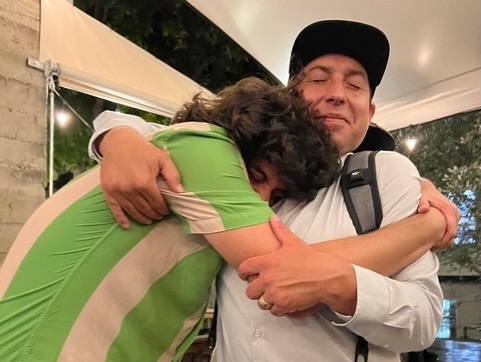Book clubs and bookshops around the Bay Area buzzed with excitement recently as two authors who happen to be best friends — Tommy Orange and Kaveh Akbar — embarked on a driving tour around Northern California, visiting shops in San Francisco, Point Reyes, Santa Rosa, Sacramento, Sausalito and Menlo Park to connect with readers.
Orange lives in Oakland and his second novel, “Wandering Stars” is a follow-up to “There There.” It explores both the past generations’ stories and the future impacts of the events described in the first novel, including the legacies of the Sand Creek Massacre of 1864 and the Carlisle Indian Industrial School. Akbar’s first novel, “Martyr!” tells the story of Cyrus Shams, a young Iranian American man and recovering alcoholic who’s obsessed with the concept of a meaningful death. The two writers spent years passing pages back and forth, offering each other support and inspiration as they crafted their novels, each of which has generated no small amount of literary acclaim.
Orange and Akbar recently stopped along their tour — carving out a few minutes while signing a small mountain of books at Kepler’s in Menlo Park — to discuss their friendship, uncanny parallels between their novels and their feelings about the Bay Area.
Responses have been edited for clarity and length.
Q: How did you two meet and become friends?
KA: Tommy came to read at Purdue University, where I was teaching at the time, just after “There There” had come out. I was in charge of taking Tommy around. And over the course of driving him around, we started to realize that there were all these uncanny symmetries in our stories, interests and experiences, from having a shared love of “The Simpsons” and basketball, to addiction in our various and sundry life story histories, and in talking about that, there was this in-joke phrase that developed. That night, Tommy emailed me a poem with that phrase. Not to be outdone by a novelist, I, the poet in our friendship, stayed up all night and wrote him a poem in response to that phrase. And so, within 12 hours of meeting each other, we’d already written poems for each other — which is an auspicious portent for a friendship. We never stopped writing to each other or talking to each other from that point forward.
Wandering Stars by Tommy Orange (Vintage, $18) is a follow-up novel to There There, and expands on the family’s story through previous generations and in the aftermath of the events that took place in There There. (Courtesy Vintage)
Q: Tommy, there is so much Oakland love in “Wandering Stars,” and in your first book, “There There.” What do you hope that Oaklanders, and Bay Area residents more broadly, take away from your books?
TO: There are not a lot of Oakland novels out there. People point to work by Gertrude Stein and Jack London that’s a hundred years old. My books got a lot of visibility, and to have people see themselves and have that be part of the conversation is a cool thing that happened. When you read something in a book that speaks to something that you’ve thought or felt that you’ve never seen before, it does something else, too. Community building makes you feel less lonely, and like the thing you’re a part of is real. It gives it a dimension that it didn’t have before.
Q: “Wandering Stars” builds on the story in “There There,” telling stories from the past generations and the futures of the characters we got to know in “There There.” What inspired you to extend that timeline in a second book?
Tommy Orange was a Pulitzer finalist for his first book, “There There,” about a group of Native Americans living in Oakland. His new “Wandering Stars” serves as both a prequel and sequel. (Courtesy Michael Lionstar)
TO: At first, I was writing a straightforward sequel. Then, in 2019, I went to Sweden for the translation of “There There.” They brought me to a museum, and on a tour, while the guide was explaining how problematic museums are, wanting to be self-aware while still not knowing what to do about it, he said, “We have some of your people’s stuff, if you want to see it.” That stuff was Southern Cheyenne, from Florida in 1875. I fell down a historical rabbit hole about the origin of boarding schools. My tribe was at the center. While I was doing research for that, I found that one of the prisoners there was named Bear Shield. From there it became a generational story, going back into the ancestors’ stories and then telling the aftermath.
Q: What was your process for working on your books in parallel and in conversation?
TO: It was very organic. We were doing weekly “what’s our word” sessions, and then we started trading pages each Friday. I want all of my favorite poets to write novels, so I wanted him to write a novel. I was already working on mine. All of a sudden we were trading novel pages. Then, we both ended up at Knopf with the same editor.
“Martyr!” by Kaveh Akbar (Vintage, $18) is a best-selling novel, freshly in paperback, that was shortlisted for the National Book Award and named one of the New York Times Book Review’s 10 Best Books of the Year. (Courtesy Vintage)
Q: Reading your books back-to-back, I noticed so many similarities, from the different topics you explore (addiction, generational trauma), and even using quotes from the same author, Clarice Lispector. Were these topics you were talking about? Or did this happen mostly through swapping pages?
KA: It was mostly in the pages — and through osmosis, vibes. But there was eerie stuff, too. We both within the same interval gave each other pages where we had named a character Jude. There’s a horse in my book named Badbadak, which in Persian, the name for kite is badbadak, which translates literally to little wind wind, and Tommy has a horse named for something similar in his book.
Q: Kaveh — what are your impressions of the Bay Area? What has it been like doing this whirlwind road trip with Tommy?
Iranian-American poet and writer Kaveh Akbar is close friends with Oakland author Tommy Orange. The two authors wrote their acclaimed best-selling books while sharing pages with each other back and forth each week. (Courtesy Beowulf Sheehan)
KA: You know how the Inferno is Dante being led through hell by Virgil? This is just like that, but the nice version. It’s like Paradiso but I don’t think Virgil leads Dante through Paradise in Paradiso, so the metaphor kind of falls apart. But it’s like I have the mayor of the Bay Area, who has a literal key to the city, showing me around, and the people who love him are coming out. My favorite way to fall in love with a thing is through the eyes of someone that I love loving it. And so, getting to watch Tommy look at the things he loves and fall in love with them transitively through that feels really lucky. It is a good way to fall in love with a city.
Related Articles
Grateful Dead’s longtime videographer reflects on his ‘wild ride’ with Jerry Garcia
Review: City Lights in San Jose delights with classic ‘Mousetrap’
9 charming Bay Area library cafes, where books meet pastry, banh mi and more
Juanita Ulloa wrote the book on mariachi — literally
Reading Romp: Educational play area opens in Saratoga Library
Q: What is one thing you hope people take away from your book?
KA: A sense of amongness. A sense that there is precedent for feeling not particularly attached to remaining alive, and for feeling like endlessly reprocessing your own sadness and every emotion to the point that you’re wearing lesions into your brain and into your stomach, might have a station, a terminal at which you can maybe step out of the ride. And just a sense of having been present. When I looked in the 811.5 section in the library as a kid and saw all those poetry spines, I saw a proof of concept for a kind of being alive that I wanted to attain. I hope that they see a spine with a name that looks like theirs, maybe, or with a story that feels like theirs.
If you or someone you know is struggling with feelings of depression or suicidal thoughts, the 988 Suicide & Crisis Lifeline offers free, round-the-clock support, information and resources for help. Call or text the lifeline at 988, or see the 988lifeline.org website, where chat is available.





